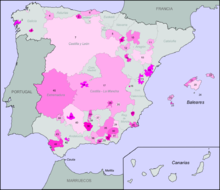
Campo de Cartagena is a Spanish geographical indication for Vino de la Tierra wines located in the autonomous Region of Murcia. Vino de la Tierra is one step below the mainstream Denominación de Origen indication on the Spanish wine quality ladder.

Abanilla was a Spanish geographical indication for Vino de la Tierra wines located in the autonomous region of Murcia. Vino de la Tierra is one step below the mainstream Denominación de Origen indication on the Spanish wine quality ladder.

Castelló is a Spanish geographical indication for Vino de la Tierra wines located in the province of Castellón in the autonomous region of Valencia. Vino de la Tierra is one step below the mainstream Denominación de Origen indication on the Spanish wine quality ladder.
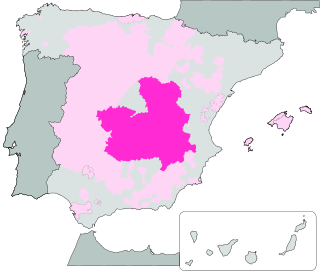
Castilla is a Spanish geographical indication for Vino de la Tierra wines located in the autonomous region of Castilla-La Mancha. Vino de la Tierra is one step below the mainstream Denominación de Origen indication on the Spanish wine quality ladder.

Valdejalón is a Spanish geographical indication for Vino de la Tierra wines located in the wine-producing area of Valdejalón, in the province of Zaragoza, in the autonomous region of Aragon, Spain. Vino de la Tierra is one step below the mainstream Denominación de Origen indication on the Spanish wine quality ladder.

Valle del Cinca is a Spanish geographical indication for Vino de la Tierra wines located in the wine-producing area of the Cinca Valley, in the province of Huesca, in the autonomous region of Aragon, Spain. Vino de la Tierra is one step below the mainstream Denominación de Origen indication on the Spanish wine quality ladder.

Cádiz is a Spanish appellation describing Vino de la Tierra wines whose terroir is located in the autonomous region of Andalusia. Vino de la Tierra is one step below the mainstream Denominación de Origen indication on the Spanish wine quality ladder.
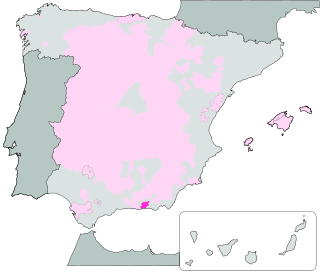
Contraviesa-Alpujarra is a Spanish geographical indication for Vino de la Tierra wines located in the Alpujarras mountains, in the autonomous region of Andalusia. Vino de la Tierra is one step below the mainstream Denominación de Origen indication on the Spanish wine quality ladder.

Desierto de Almería is a Spanish geographical indication for Vino de la Tierra wines located in the autonomous region of Andalusia. Vino de la Tierra is one step below the mainstream Denominación de Origen indication on the Spanish wine quality ladder.
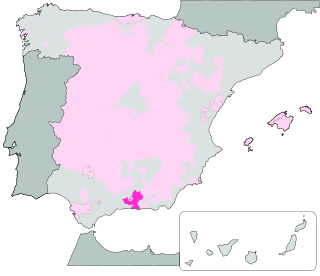
Granada Sur-Oeste is a Spanish geographical indication for Vino de la Tierra wines located in the autonomous region of Andalusia. Vino de la Tierra is one step below the mainstream Denominación de Origen indication on the Spanish wine quality ladder.

Laujar-Alpujarra is a Spanish geographical indication for Vino de la Tierra wines located in the autonomous region of Andalusia. Vino de la Tierra is one step below the mainstream Denominación de Origen indication on the Spanish wine quality ladder.

Norte de Almería is a Spanish geographical indication for Vino de la Tierra wines located in the autonomous region of Andalusia. Vino de la Tierra is one step below the mainstream Denominación de Origen indication on the Spanish wine quality ladder.

Ribera del Andarax is a Spanish geographical indication for Vino de la Tierra wines located in the autonomous region of Andalusia. Vino de la Tierra is one step below the mainstream Denominación de Origen indication on the Spanish wine quality ladder.

Sierra Norte de Sevilla is a Spanish geographical indication for Vino de la Tierra wines located in the Sierra Norte de Sevilla range of the Sierra Morena, Andalusia, southern Spain. Vino de la Tierra is one step below the mainstream Denominación de Origen indication on the Spanish wine quality ladder.
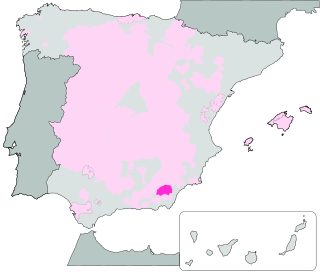
Sierras de las Estancias y los Filabres is a Spanish geographical indication for Vino de la Tierra wines located in the autonomous region of Andalusia. Vino de la Tierra is one step below the mainstream Denominación de Origen indication on the Spanish wine quality ladder.

Formentera is a Spanish geographical indication for Vino de la Tierra wines located in Formentera in the autonomous region of the Balearic Islands, Spain. Vino de la Tierra is one step below the mainstream Denominación de Origen indication on the Spanish wine quality ladder.

Ibiza is a Spanish geographical indication for Vino de la Tierra wines located in the autonomous region of the Balearic Islands, Spain. Vino de la Tierra is one step below the mainstream Denominación de Origen indication on the Spanish wine quality ladder.

Illes Balears is a Spanish geographical indication for Vino de la Tierra wines located in the autonomous region of the Balearic Islands, Spain. Vino de la Tierra is one step below the mainstream Denominación de Origen indication on the Spanish wine quality ladder.

Isla de Menorca is a Spanish geographical indication for Vino de la Tierra wines located in the autonomous region of the Balearic Islands, Spain. Vino de la Tierra is one step below the mainstream Denominación de Origen indication on the Spanish wine quality ladder.
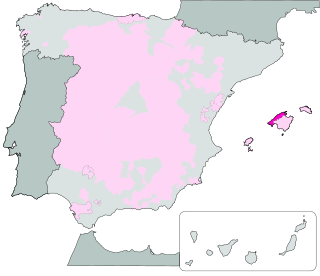
Serra de Tramuntana-Costa Nord is a Spanish geographical indication for Vino de la Tierra wines located on the north coast of the island of Mallorca in the autonomous region of the Balearic Islands, Spain. Vino de la Tierra is one step below the mainstream Denominación de Origen indication on the Spanish wine quality ladder.



























